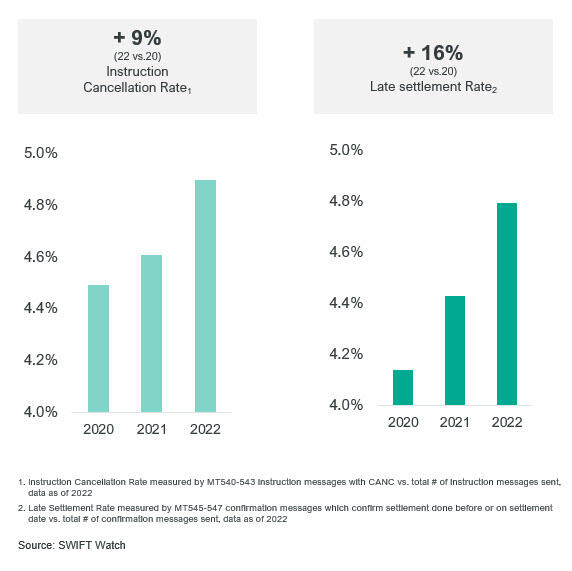Major improvements have been made to the securities services operating model over the last decade, but inefficiencies in the trade settlement process continue to be a recurrent challenge – and it requires a speedy resolution.
The number of trades that fail to settle on time should not be underestimated. Swift business intelligence has shown that five out of every 100 securities transactions sent for settlement will not complete on their expected settlement date. While this might not seem like a lot, it translates to billions in operational costs and fees for the industry.
The overall picture shows the number of fails growing too, as seen below:

Let’s take a look at why trades fail, what firms can do to reduce the number of settlement fails, and the opportunities this opens up.
Why do trades fail?
“Settlement fail rates typically increase when there are unstable market conditions, as we’ve experienced in the past few years. With a significant hike in transaction volumes, it inevitably follows that settlement fails will rise in tandem,” said Charifa El Otmani, Director of Capital Markets Strategy at Swift. “But market events and heightened geopolitical tensions are not the only factors driving up the number of settlement fails. They’re also a result of long-standing challenges facing the securities industry that we’re working to overcome.”
Cross-border transactions are especially prone to failure. “This is because international transactions have longer intermediary chains, multiple regulatory jurisdictions and rely on a variety of different messaging formats, data standards and technology platforms. Even so, this is not an acceptable excuse for poor settlement discipline,” El Otmani said.
Human error is another major contributor to settlement fails. With many smaller financial institutions still heavily reliant on manual systems, it’s not uncommon for individuals in operations to simply key in the wrong data, for example, in a standing settlement instruction.
No time for complacency
This opens market participants to different risks. For trading counterparties, the implications of fails can be serious. For instance, a fail could result in an investment manager missing a trading opportunity, contributing to a decline in client returns. Alternatively, when securities are not delivered, it can exacerbate credit risk. Regular settlement fails can also have an adverse impact on overall client experiences, potentially leading to reputational damage.
Fails can also lead to additional costs. “Daily charges under the Settlement Discipline Regime (SDR) are being enforced for trades that fail to settle on time in EU-based central securities depositories. And mandatory buy-ins for counterparties remains a real prospect from 2025,” said El Otmani.
The global trend towards T+1 settlement is likely to further incentivise market participants to optimise their processes. India is now live with T+1 for equities, while the US and Canada have confirmed adoption of T+1 in 2024. The UK has launched a task force to examine the case for shorter settlements. And the EU – despite some initial scepticism about adopting shorter settlement cycles – is also evaluating the merits of moving to T+1.
“Shorter settlement cycles compress the time available for counterparties to settle their trades. With less time to settle, if we don’t take action as an industry, fails are expected to increase, and so will the penalties. Given this trajectory, the current fail rate for post-trade settlement is clearly not sustainable – and even less so if mandatory buy-ins are imposed,” highlighted El Otmani.
Transparency is key going forward
Getting settlement fails under control is not an impossible task for financial institutions and can be achieved if market participants make a few relatively simple changes to their business operations. The most obvious would be if the wider industry were to adopt the Unique Transaction Identifier (UTI). This is an ISO messaging standard that is a key enabler to track transactions end to end throughout the lifecycle of a trade and across the two sides of the transaction, allowing for much easier investigation and exception handling.
“The UTI will enable counterparties to gain better transparency into the trading settlement lifecycle, helping them identify trades at risk of failing and take action to fix them before the settlement date,” said El Otmani.
Already used in the reporting of over-the-counter (OTC) derivatives and securities financing trades, financial firms and industry bodies, together with Swift, are rolling the UTI out to other types of securities transactions. “We estimate that the UTI could help to halve the number of pre-settlement exceptions requiring investigation with a counterparty, and reduce by 90% the number of matching or timing fails,” acknowledged El Otmani.
What can firms do?
The advantages of the UTI can only be realised if financial institutions collaborate. “If transformation is to happen and the industry is to mitigate settlement fails, then the securities industry will need to work together,” said El Otmani.
“Firms have a choice as to whether they invest in their operations in an isolated or siloed way, or engage with their peers to tackle the root causes of settlement fails. If more institutions embrace the UTI, the industry-wide benefits will ultimately be significant.”
The views expressed on these pages are those of the authors and/or the institution they represent, and not necessarly those of Swift.
Find out more about the UTI
Learn more about the Unique Transaction Identifier and how it can benefit your organisation.



